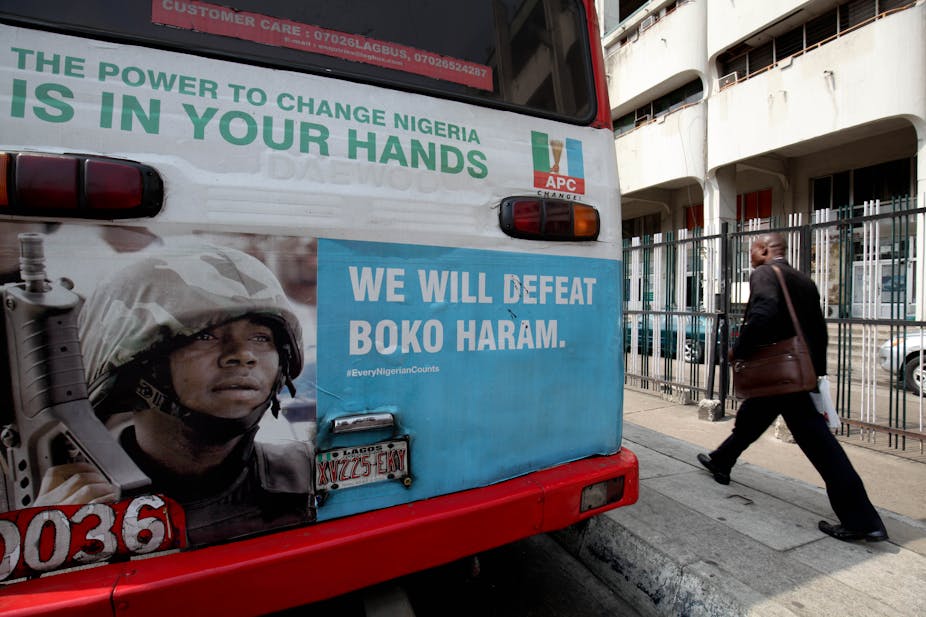Last year I shared a panel with Nigeria’s deputy electoral commissioner, who assured our audience without reservation that everything would be ready on time for the 2015 presidential election. It is apparently not.
The one person not complaining about the postponement of the Nigerian elections is President Goodluck Jonathan. He insists that he was not involved in the electoral commission’s decision – but unlike his chief opponent, Muhammadu Buhari, he has not protested it either.
The electoral commission’s cited reasons for postponement were security and the incomplete distribution of voters’ identity cards. The Boko Haram insurgency in the north of the country has meant great difficulties in ensuring safe voting in a number of areas. The number of troops committed to the area means too few are available to safeguard polling stations in the rest of the country.
Two-step
The security pretext is obviously disingenuous. The main elections have been postponed from 14 February to 28 March; Boko Haram simply will not be defeated in that time, despite a major government offensive.
In fact, the battle has been taken to Boko Haram far more effectively in recent weeks by units from Chad, Niger and Cameroon. The Nigerian military has shown little of the gusto and concentrated response of its neighbours’ forces – and of a 130,000-strong Nigerian army, only about 30,000-40,000 are fighting in the north.
The presidential and National Assembly elections will now occur on March 28, but the elections for governorships and state assemblies have been delayed until April 11. Both the presidency and the National Assembly are vulnerable to the opposition All Progressives Conference (APC), and Jonathan will badly need the extra time to push back with a strong challenge.
The only problem is that, under Nigeria’s complex election requirements, it is quite possible no one will be declared the winner. To ensure national unity, a successful presidential candidate must win at least a quarter of the votes in two thirds of all the federal states. If that does not happen, a runoff vote has to occur within seven days of the first result being announced. This will jam together a second presidential contest with those for the governorships and the State Assembles, and it is likely that chaos will occur.
The tragedy in Nigeria is not what is already a botched election, but that within the election there is almost no mention of the victims of Boko Haram. The Chibok schoolgirls are not a campaign issue. What to do long-term about Islamic insurgency is not an issue. Goodluck Jonathan has no policies about how to make the north as prosperous as the south.
Straighten up
Meanwhile, new technocratic blood is invigorating traditional governing structures in the north. One of the new traditional rulers is Lamido Sanusi, the Emir of Kano, who was until recently the internationally-acclaimed governor of the Nigerian Central Bank; his complaints about corruption within Jonathan’s administration got him sacked.

Corruption is a huge issue in Nigeria, but not as much of an election issue as might be expected. That’s partly because many of the powerful men and women who deserted Jonathan to form the APC have corrupt records themselves. But the president has also made light of corruption; he has not made much effort to condemn it, and seems instead accept it as part of the fabric of Nigerian political life.
On the other hand, Jonathan’s opponent, Muhammadu Buhari, is a former military president who ruled from 1983 to 1985. I remember queueing up at Lagos International airport in 1983 in the rigidly straight military style he imposed on all queues. Soldiers pointed guns at us to ensure we stayed in line. It was curiously wonderful to see this touch of discipline, though the wonder was immediately dispelled when I had to bribe my way into my own reserved hotel room.
But Buhari has a reputation of being personally uncorrupted. Whether, if given the chance again, he would straighten Nigeria out is a big question – one that Goodluck Jonathan is obviously trying to keep unanswered.

